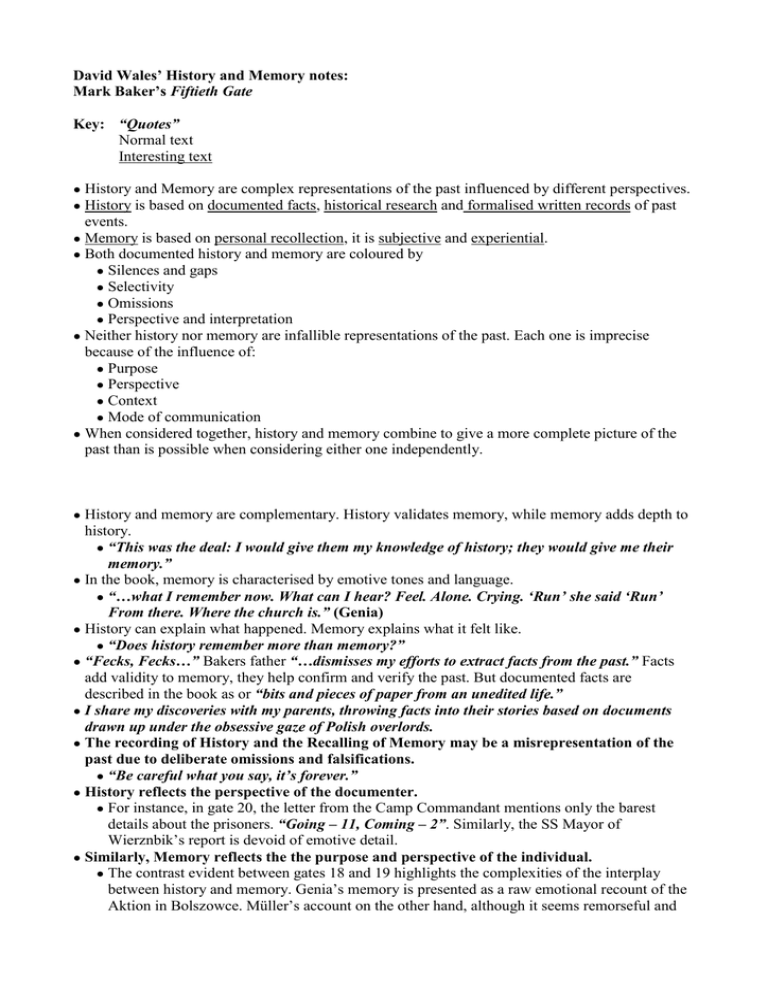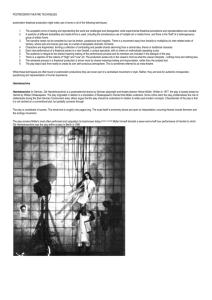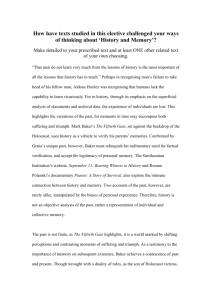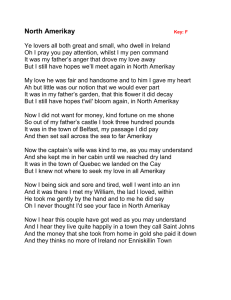File - History and Memory
advertisement

David Wales’ History and Memory notes: Mark Baker’s Fiftieth Gate Key: “Quotes” Normal text Interesting text ● ● History and Memory are complex representations of the past influenced by different perspectives. History is based on documented facts, historical research and formalised written records of past events. ● Memory is based on personal recollection, it is subjective and experiential. ● Both documented history and memory are coloured by ● Silences and gaps ● Selectivity ● Omissions ● Perspective and interpretation ● Neither history nor memory are infallible representations of the past. Each one is imprecise because of the influence of: ● Purpose ● Perspective ● Context ● Mode of communication ● When considered together, history and memory combine to give a more complete picture of the past than is possible when considering either one independently. ● History and memory are complementary. History validates memory, while memory adds depth to history. ● “This was the deal: I would give them my knowledge of history; they would give me their memory.” ● In the book, memory is characterised by emotive tones and language. ● “…what I remember now. What can I hear? Feel. Alone. Crying. ‘Run’ she said ‘Run’ From there. Where the church is.” (Genia) ● History can explain what happened. Memory explains what it felt like. ● “Does history remember more than memory?” ● “Fecks, Fecks…” Bakers father “…dismisses my efforts to extract facts from the past.” Facts add validity to memory, they help confirm and verify the past. But documented facts are described in the book as or “bits and pieces of paper from an unedited life.” ● I share my discoveries with my parents, throwing facts into their stories based on documents drawn up under the obsessive gaze of Polish overlords. ● The recording of History and the Recalling of Memory may be a misrepresentation of the past due to deliberate omissions and falsifications. ● “Be careful what you say, it’s forever.” ● History reflects the perspective of the documenter. ● For instance, in gate 20, the letter from the Camp Commandant mentions only the barest details about the prisoners. “Going – 11, Coming – 2”. Similarly, the SS Mayor of Wierznbik’s report is devoid of emotive detail. ● Similarly, Memory reflects the the purpose and perspective of the individual. ● The contrast evident between gates 18 and 19 highlights the complexities of the interplay between history and memory. Genia’s memory is presented as a raw emotional recount of the Aktion in Bolszowce. Müller’s account on the other hand, although it seems remorseful and emotional at times, is clearly a selective fabrication. Its purpose is to hide his guilt and portray himself as a “...slave to the SS” In contrast to his stated victimisation, documented history describes his “...rise within the ranks of the SS…” as “…rapid and meteoric…” ● “Does history remember more than memory?” ● In contrast to Genia’s individual memory, backed up only by a hand scrawled note in Russian mentioning that her parents were the only survivors from her town, and another note by her father documenting an alternative version of reality which also omits her name, Yossl’s memory is supported by the collective memory of the Buchenwald boys, along with verifiable “fecks” in formal records like the Memorial book. Initially Genia and Yossl have conflicting views to Baker regarding History and Memory. Yossl and Genia initially feel that history should be left in the past. The “Fecks, Fecks…” are like “...shopping lists” – having no real meaning when disconnected from personal experience. Baker on the other hand, feels initially that memory, no matter how interesting and important, cannot be regarded as fact without historical verification. Gradually, both parties begin to realise the importance of joining history and memory to create a better representation of the past. “… It always begins in blackness, until the first light illuminates a hidden fragment of memory...” History is written with a certain purpose and perspective. Historical records are usually written with a disconnected tone, as evident in the “Proceedings and examination records on the atrocities of the Nazis in the Bolszowce District…”: “...On the first day of occupation, they began exterminating the peaceful population…” While this statement documents the atrocities of the Nazis, it does nothing to convey the sense of fear and panic associated with it. This can only be explained through the experiential aspects of memories such as Yossl’s and Genia’s. “Were you there?” “What do you know about Aktions? … Screams, crying. A massacre of weeping lambs.” “You think that because you’ve read a few pieces of paper that you suddenly understand everything?” “You read, you read. Books, books, everywhere. But do you know how it feels?” Both history and memory are fallible. The formal authoritative tone of the Geographical Dictionary of the Polish Kingdom provides the facts about Genia’s town but communicates no understanding of the people, their lives and experiences. “BOŁSZOWCE: Bułszowce, originally Bohuszowce, a small town in the Tohatyn district, situated on the Dniester plains; 1 mile from Halicz and the River Dniester; 15 miles from Lwów to the South East. This small town is spread over the marsh plain along the river Zgniła Lipa which, in its turn, falls into the Cniester, and along the streamlet of Narajówka. The locality, together with adjacent villages, is in the possession of Kornel Krzeczunowicz, member of the Galician Parliament and…” “What are these papers anyway except echoes of the past, dark shadows without screams, without smells, without fear?” The book History and Memory is written to reflect the structure of memory. It is disjointed and nonlinear. However, in an ironic twist, Baker’s documentation and recording of his parent’s memory takes it partway into the domain of history. “…it is forever…” OTHER QUOTES: Genia: ● “… the Polish Count’s palace – what was his name? I’ve forgotten, but it will come back to me.” ● “What would you remember before you were eight?” ● “I wish I could forget.” ● “When the war started – like yesterday.” ● “Don’t interrogate me–I’m your mother, not your prisoner.” ● “Do you think your little children will remember where they used to live before they were five?” ● “…What I remember now. What can I hear? Feel. Alone. Crying. ‘Run’ she said ‘Run’ From there. Where the church is.” ● “Screaming, the sound of shots, mothers separated from their children.” ● “… Shooting…” “… a hole in the wall unit…” “… dark… stuffy, crowded, frightening…” ● “… they were screaming ‘Juden raus! Jews get out!” ● “I’m still scared of darkness…” ● “I can feel it, how it happened.” ● “‘Genia you’re not allowed, you’re not allowed to say anything…’” ● “I can’t forget these moments for as long as I live.” ● “I was the only young survivor from Bołszowce.” ● “… who is going to write such a book?” ● “… the village burned. I couldn’t walk…” ● “His [Genia’s father’s] feet were bundled in rags.” Yossl: ● “What for do I have to remember this?” ● “Fecks, Fecks…” ● “This I didn’t know.” ● “… they started to hit everybody, my sisters, me, they hit us all.” ● “We didn’t even know if he was alive.” ● “All I remember is that it came to us, a little box with ash, and also his clothes, sent to our home. Was it him? We didn’t know.” ● “Then they buried the ashes. That was it. I had no father.” Letter from Koch: ● “In spite of having given him the best medicines, it was unfortunately not possible to save the patients’s life.” ● “Prisoner Number 5503” Müller: ● “I was a slave to the SS and I had committed myself to these things with part of me saddened and with inner torment.” ● “I was white as chalk…” ● “Because I was the SS commander I couldn’t run away.” Eyewitness contradictions of Müller: ● “… he [Müller] remained and kicked a baby…” ● “Müller did not merely watch. On one occasion he reserved for himself the privilege of shooting three young naked Jewish women.” Baker’s historical contradiction of Müller: ● “… Müller’s rise within the ranks of the SS was rapid and meteoric.” ● “His contributions to the party were rewarded with promotions and the prestigious golden insignia – the Death’s Head ring and the honorary dagger of the Storm Troopers.” Baker: ● “I want to break the silence for him… to force him to look back.” ● “It always begins in blackness until the first light illuminates a hidden fragment of memory.” ● “The light forms a tunnel which guides our eyes...” ● “Throwing facts into their stories” ● “Seeking signs of intimacy with fragmented moments from his childhood.” ● “Not even your birth certificate – your year is missing from the town registry.” ● “He never spoke of his mother and father; they are faceless and nameless.” ● “I can show you what your father wore when he arrived in Buchenwald.” ● “When I return memory to them – only then can I assume responsibility for their stories.” (gives a sense of survivor guilt.) ● “‘What kind of underwear?’ he wants to know. ‘What kind of face?’ I want to know.” ● “His [Müller’s] contribution to the party was rewarded with promotions and the prestigious Death’s Head ring.” ● “His [Müller’s] rise through the SS was rapid and meteoric.” ● “I had always believed that all these documents were burned along with the people whose lives they portrayed. Himmler himself had communicated his desire to erase the past so that it would be buried as a ‘page of glory never to be written.’” ● “For my father, the rivers have not thawed until now, when his words break out from their glacial silence, releasing a torrent whose flow runs backward into his darkest nights. ● “Sixty thousand Jews walked out of the European concentration camps. Within a week twenty thousand had died.” ● “It’s true. I mean I believed you, but it’s really true.” ● “… a silence we thought we understood, but could never flesh out.” ● “How does one measure these things?” ● “Each detail was embellished by the use of her hands…” ● “Perhaps she sensed that she alone held the key to those stories.” ● “My father’s fate was not possessed of the same urgency as hers. His was a past written on a page of history shared by other survivors.” ● “My mother could not point to anyone…” ● “Who will remember for my mother?” ● “Where is your memorial book?” ● “There are 896 Memorial Books in the Yad Vashem library… none of them recognise my mother’s town as a place which was also transformed into a city of slaughter.” ● “What are these papers anyway except echoes of the past, dark shadows without screams?” ● “Does history remember more than memory?” ● “They recall a little girl staring endlessly out of a window. My mother recalls a little girl hiding in a dark cellar.” ● Maybe, … [Genia’s father] reconstructed his life because he could not live with his real one…” ● “… narrating a new story.” ● “It was not the facts that were under suspicion, but her credibility as a survivor.” ● (Russian note) “Among 1380 people, one family survived by chance. They were Leo Krochmal and his wife Rosa.” ● “The chairs were filled with old boys gesturing wildly and chattering in Yiddish.” ● “Through this gate all other gates may be seen.” ● “It always begins in blackness until the first light illuminates a hidden fragment of memory.” Recorded History represents a more formally documented version of past events. BUT it is a construct reflecting the perspective of the documenter. Conflict between different historical reports: Gate 14: SS Mayor of Wiersbnik: “The Jewish Council of Elders is ‘always finding ways and means not to carry out directives and to circumvent them.’” “The Jewish Council of Elders is obliged to provide the Mayor every Monday with a written report on Jews moving in or moving out. Despite repeated warnings, these reports do not arrive within the determined time.” “When the Jews were relocated here from Litzmannstadt (Łódź), I delivered 1306 portions of food upon the request of the Jewish Council of Elders. The sum of 326 zloty per portion was to be paid back by the Council of Elders. Despite the fact that I divided the payment into instalments of 50 zloty per month, up to today nothing has been paid. In contrast to these reports, the Jewish Elders had this to say. “Over the last few weeks we have ben attempting to travel to Warsaw with the aim of seeking financial help from you for the poor people of our town. However, we are unable to get out of here. As a result of the exceptional situation in Wierzbnik, our trip has been impossible. Recently we tried to get out via Radom, where we stayed for a few days, but because of heavy snowfalls, we were unable to travel. The situation of the Council whose responsibility it is to look after the people here is simply tragic. All of our hands fall down as we can no longer assist those calling for help. An even greater misfortune for our town is the ever-increasing wave of deportees from Łódź and its surrounds, whom we have to provide with food and accommodation.” A later letter stated the following: “… we have still not received the money, during which time our situation has worsened considerably. We find ourselves on the threshold of a great catastrophe – all the men of the town, and part of the women, are daily employed in unpaid forced-labour works, which makes it impossible for them to earn money. It is a burning issue now, our request for help, otherwise we face the threat of the destruction of our people. We turn to you in desperation, hoping you will understand our tragic predicament. We ask for speedy help – if it does not come immediately, it will be too late.” In contrast to the perspective of the Jewish Elders, the SS Mayor complains that the Elders are not doing their job. “According to directives, the Jewish Council of Elders is obliged to take care of members of its religion who are in need of help. Despite my admonition I have ascertained that homeless and mentally deranged people wander about on the streets in completely ragged clothes, barefoot, etc. The recording of History and the Recalling of Memory may be a misrepresentation of the past due to deliberate omissions and falsifications.








